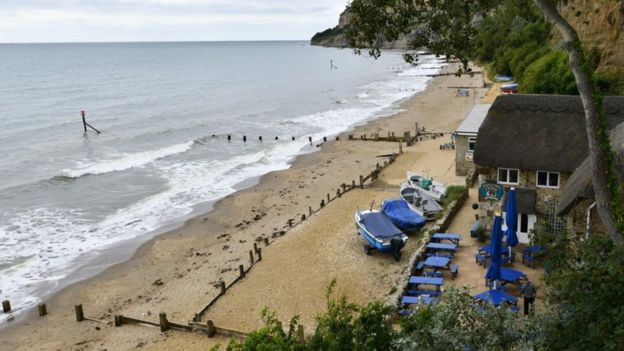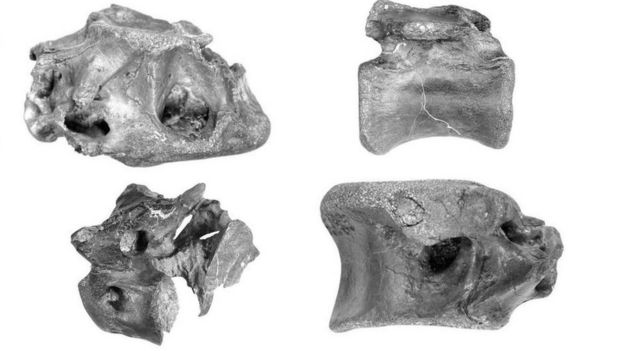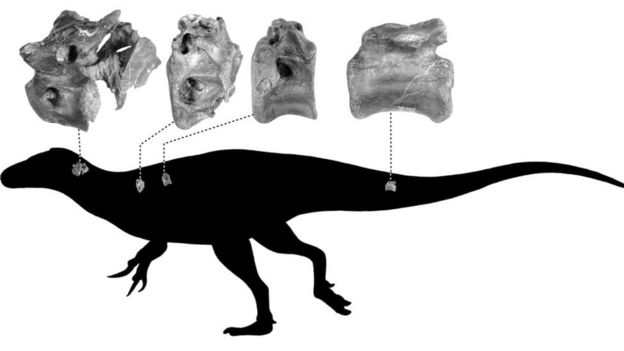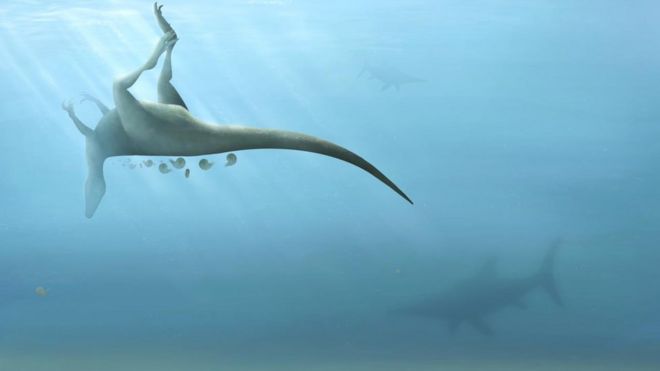A new species of dinosaur has been discovered on the Isle of Wight.
Palaeontologists at the University of Southampton believe four bones found at Shanklin last year belong to a new species of theropod dinosaur.
It lived in the Cretaceous period, 115 million years ago, and is estimated to have been up to 4m (13ft) long.
It has been named Vectaerovenator inopinatus and belongs to the group of dinosaurs that includes Tyrannosaurus rex and modern-day birds.
The name refers to the large air spaces found in some of the bones - from the neck, back and tail of the creature - which is one of the traits that helped the scientists identify its theropod origins.
These air sacs, also seen in modern birds, were extensions of the lung, and it is likely they "helped fuel an efficient breathing system while also making the skeleton lighter", the University of Southampton said.

The fossils were found in three separate discoveries in 2019 and handed in to the nearby Dinosaur Isle Museum at Sandown, where they are being displayed.
Robin Ward, a regular fossil hunter from Stratford-upon-Avon, was visiting the Isle of Wight with his family when they made their discovery.
"The joy of finding the bones we discovered was absolutely fantastic," he said.
James Lockyer, from Spalding, Lincolnshire, was also visiting the island when he found another of the bones.

"It looked different from marine reptile vertebrae I have come across in the past," he said.
"I was searching a spot at Shanklin and had been told, and read, that I wouldn't find much there.
"However, I always make sure I search the areas others do not, and on this occasion it paid off."
Paul Farrell, from Ryde, added: "I was walking along the beach, kicking stones and came across what looked like a bone from a dinosaur.
"I was really shocked to find out it could be a new species."
'Delicate skeleton'
Chris Barker, who led the University of Southampton study, said: "We were struck by just how hollow this animal was - it's riddled with air spaces.
"Parts of its skeleton must have been rather delicate.
"The record of theropod dinosaurs from the 'mid' Cretaceous period in Europe isn't that great, so it's been really exciting to be able to increase our understanding of the diversity of dinosaur species from this time.
"You don't usually find dinosaurs in the deposits at Shanklin as they were laid down in a marine habitat. You're much more likely to find fossil oysters or drift wood, so this is a rare find indeed."
It is likely that the Vectaerovenator lived in an area just north of where its remains were found, with the carcass having washed out into the shallow sea nearby.
The university findings are due to be published in the journal Papers in Palaeontology and co-authored by those who discovered the fossils.

Latest Stories
-
Johnnie Walker launches inaugural Ghana Golf Championship
4 minutes -
Rockson-Nelson Dafeamekpor: Democratisation of legal education in Ghana
17 minutes -
China says US has ‘severely violated’ tariffs truce
20 minutes -
Why is it difficult for people to understand that Ofori-Atta is sick? – Frank Davies asks
28 minutes -
Select visionary achievers as chiefs – Daasebre Ayebiahwe urges traditional kingmakers
34 minutes -
GRA to deploy enhanced technology on E-VAT as 5000 entities prepare to onboard
38 minutes -
A Tribute to Osei Kwame Despite: Celebrating a landmark achievement in Automotive Heritage
41 minutes -
Nations FC considering quitting Ghana football – Brands Manager hints
48 minutes -
Fitch Solutions revises end-2025 forecast of cedi-to-dollar rate at GH¢13; predicts 12.9% appreciation
48 minutes -
GOIL, Star Oil drop fuel prices as cedi gains strength
52 minutes -
Africa Health Collaborative-KNUST to launch new courses in home-based care and healthcare AI
1 hour -
T-bills auction: Government fails to meet target; accepts all bids
1 hour -
Today’s Front pages: Monday, June 2, 2025
2 hours -
Hajia4Reall hints at new song release after discharge from US prison
2 hours -
How fake views, bought likes, and stolen streams create artificial celebrities
2 hours

